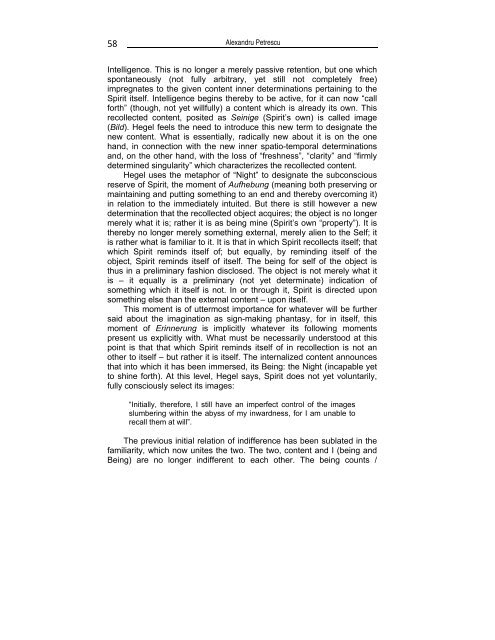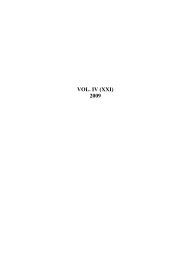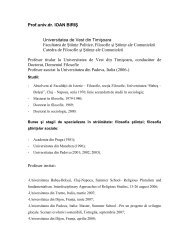analele universităţii de vest din timişoara annales universitatis ...
analele universităţii de vest din timişoara annales universitatis ...
analele universităţii de vest din timişoara annales universitatis ...
Create successful ePaper yourself
Turn your PDF publications into a flip-book with our unique Google optimized e-Paper software.
58<br />
Alexandru Petrescu<br />
Intelligence. This is no longer a merely passive retention, but one which<br />
spontaneously (not fully arbitrary, yet still not completely free)<br />
impregnates to the given content inner <strong>de</strong>terminations pertaining to the<br />
Spirit itself. Intelligence begins thereby to be active, for it can now “call<br />
forth” (though, not yet willfully) a content which is already its own. This<br />
recollected content, posited as Seinige (Spirit’s own) is called image<br />
(Bild). Hegel feels the need to introduce this new term to <strong>de</strong>signate the<br />
new content. What is essentially, radically new about it is on the one<br />
hand, in connection with the new inner spatio-temporal <strong>de</strong>terminations<br />
and, on the other hand, with the loss of “freshness”, “clarity” and “firmly<br />
<strong>de</strong>termined singularity” which characterizes the recollected content.<br />
Hegel uses the metaphor of “Night” to <strong>de</strong>signate the subconscious<br />
reserve of Spirit, the moment of Aufhebung (meaning both preserving or<br />
maintaining and putting something to an end and thereby overcoming it)<br />
in relation to the immediately intuited. But there is still however a new<br />
<strong>de</strong>termination that the recollected object acquires; the object is no longer<br />
merely what it is; rather it is as being mine (Spirit’s own “property”). It is<br />
thereby no longer merely something external, merely alien to the Self; it<br />
is rather what is familiar to it. It is that in which Spirit recollects itself; that<br />
which Spirit reminds itself of; but equally, by remin<strong>din</strong>g itself of the<br />
object, Spirit reminds itself of itself. The being for self of the object is<br />
thus in a preliminary fashion disclosed. The object is not merely what it<br />
is – it equally is a preliminary (not yet <strong>de</strong>terminate) indication of<br />
something which it itself is not. In or through it, Spirit is directed upon<br />
something else than the external content – upon itself.<br />
This moment is of uttermost importance for whatever will be further<br />
said about the imagination as sign-making phantasy, for in itself, this<br />
moment of Erinnerung is implicitly whatever its following moments<br />
present us explicitly with. What must be necessarily un<strong>de</strong>rstood at this<br />
point is that that which Spirit reminds itself of in recollection is not an<br />
other to itself – but rather it is itself. The internalized content announces<br />
that into which it has been immersed, its Being: the Night (incapable yet<br />
to shine forth). At this level, Hegel says, Spirit does not yet voluntarily,<br />
fully consciously select its images:<br />
“Initially, therefore, I still have an imperfect control of the images<br />
slumbering within the abyss of my inwardness, for I am unable to<br />
recall them at will”.<br />
The previous initial relation of indifference has been sublated in the<br />
familiarity, which now unites the two. The two, content and I (being and<br />
Being) are no longer indifferent to each other. The being counts /




